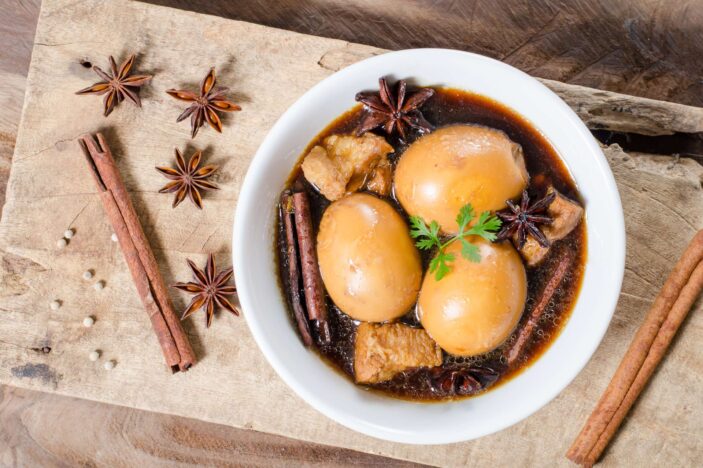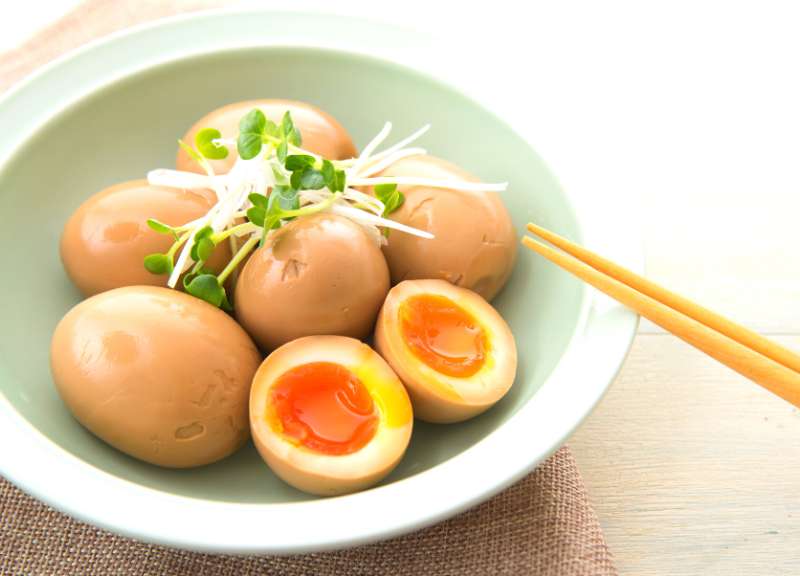Are you ready to embark on a delectable journey through the fascinating world of Asian cuisine? Today, we’re diving into Asian hard-boiled eggs, where simplicity meets extraordinary flavors.
If you’ve ever wondered how those seemingly ordinary eggs transform into culinary marvels bursting with umami goodness, you’re in for a treat.
Asian hard-boiled eggs are a true sensation, tantalizing taste buds across the globe with their unique preparation methods and mouthwatering results.
So, grab your apron and uncover the secrets behind these irresistible Asian delights!
Cooking Asian-Style Hard-Boiled Eggs

Follow these simple steps to create Asian-style hard-boiled eggs that will leave your taste buds dancing with delight. Gather the following ingredients:
Ingredients
- Six eggs
- Cold water
- 2 cups of soy sauce
- Three cloves of garlic, smashed
- 2 Thai bird chilies, smashed
- 3 inches of ginger, cut into coins
- 4 inches of lemongrass smashed
- 1/2 cup of vinegar
- One pinch of red chili flakes
- 1 cup of ice
- Cooked rice (optional)
Now, let’s get cooking!
Step 1: Preparing the Eggs
- Cover the eggs in a pot with about 2 inches of cold water.
- Set the pot on the stove over medium-high heat and bring the water to a simmer.
- Once the water reaches a simmer, remove the pot from the heat and let the eggs sit in the hot water for 11 minutes.
Step 2: Creating the Flavorful Soy Sauce Mixture
- While the eggs are simmering, prepare the soy sauce mixture. In another pot, combine the soy sauce, smashed garlic cloves, smashed Thai bird chilies, ginger coins, smashed lemongrass, vinegar, and a pinch of red chili flakes.
- Place the pot on the stove and bring the mixture to a boil.
- Turn off the heat and allow the soy sauce mixture to cool completely.
Step 3: Cooling and Peeling the Eggs
- Prepare a large bowl filled with cold water and add a cup of ice.
- After 11 minutes of simmering, carefully remove the eggs from the pot using a slotted spoon and transfer them into the ice water bath. This will cool them down quickly and make them easier to peel.
- Gently peel the eggs, not damaging the delicate whites, and set them aside.
Step 4: Marinating the Eggs
- Take a large sealable container to hold the soy sauce mixture and the eggs.
- Pour the cooled soy sauce mixture into the container to cover the eggs completely.
- Place the peeled eggs into the soy sauce mixture container, ensuring they are fully submerged.
- Seal the container tightly and place it in the refrigerator for at least four days. This will allow the eggs to absorb the rich flavors of the marinade, creating a truly authentic Asian taste.
Step 5: Serving and Enjoying
- After four days of marinating, take out one of the eggs and carefully slice it in half to check for the desired flavor and consistency.
- Serve the Asian-style hard-boiled eggs as a delicious standalone snack or alongside a bowl of steaming hot rice, allowing the flavors to complement each other perfectly.
You can create Asian-style hard-boiled eggs bursting with savory and aromatic flavors following these steps. Remember, the longer the eggs marinate, the more intense the flavors.
Related: Can you steam eggs in a steamer?
Variations and Regional Of Hard-Boiled Eggs Styles

Asian hard-boiled eggs are not limited to a single style or flavor profile. Across different regions, various variations have emerged, each with its unique twist and culinary traditions.
Let’s explore some of the most popular regional styles:
Japanese-style Hard-Boiled Ramen Eggs (Ajitsuke Tamago)
- Japanese-style hard-boiled eggs, or Ajitsuke Tamago, are a staple in ramen shops and bento boxes.
- The marinating process involves immersing the peeled eggs in a soy-based sauce infused with flavors like mirin (sweet rice wine), sake, and dashi (Japanese soup stock).
- The resulting eggs have a creamy, savory taste with a subtle sweetness, adding depth to any dish they accompany.
Chinese-style Hard-Boiled Eggs (Cha Ye Dan)
- Chinese-style hard-boiled eggs, known as Cha Ye Dan, feature a distinctive marbling effect on the egg whites.
- The cooking process involves simmering the eggs with tea leaves, spices like star anise, cinnamon, black peppercorns, and soy sauce for a rich and fragrant infusion.
- The cracked shells create intricate patterns on the egg whites, resulting in a visually striking dish with an aromatic and subtly spiced taste.
Malaysian-style Hard-Boiled Eggs (Telur Masak Kicap)
- Malaysian-style hard-boiled eggs, or Telur Masak Kicap, are known for their sweet and savory flavor.
- These eggs are cooked in a flavorful mixture of sweet soy sauce, aromatics like garlic and shallots, and sometimes spices such as cinnamon or star anise.
- The sauce caramelizes during cooking, coating the eggs with a luscious glaze that enhances their rich, sweet taste.
Korean-style Hard-Boiled Eggs (Gyeran Jjim)
- Korean-style hard-boiled eggs, called Gyeran Jjim, are steamed instead of boiled, resulting in a unique texture and delicate taste.
- The eggs are mixed with seasonings like soy sauce, sesame oil, and sometimes gochujang (Korean chili paste) before being steamed to perfection.
- The result is a soft and custardy texture, making them a perfect accompaniment to a bowl of steamed rice or a topping for various Korean dishes.
Conclusion
The key to achieving the perfect Asian hard-boiled eggs lies in the selection of fresh ingredients, the careful cooking process, and the patience to let them marinate for a few days.
Allow these flavors to develop and deepen, transforming ordinary eggs into extraordinary culinary delights.
As you continue to explore the vast and diverse world of Asian cuisine, let the journey of Asian hard-boiled eggs serve as a reminder that food can connect us, celebrate our cultural heritage, and bring joy to our palates.
So, embrace the flavors, savor the textures, and keep discovering the wonders that Asian cuisine has to offer.
Enjoy the incredible journey of hard-boiled Asian eggs, and let your taste buds be your guide!
Happy cooking!
